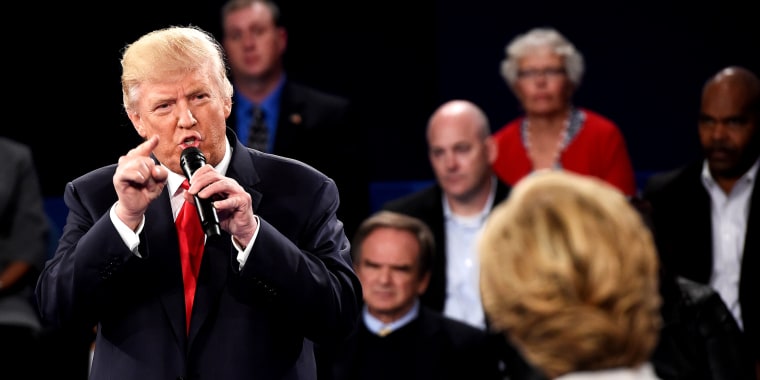Donald Trump lost in his fight against Hillary Clinton. No, this is not the opening scene of an alternative reality show in which the audience steps back in time and Clinton wins the 2016 presidential election. It is the final scene of a fight that ended Thursday when federal Judge Donald Middlebrooks threw out a lawsuit former President Trump filed against former Secretary of State Hillary Clinton, calling Trump’s filing “difficult to summarize in a concise and cohesive manner.” In fact, that was perhaps the kindest thing one can say about Trump’s lawsuit.
Judge Donald Middlebrooks threw out a lawsuit against Hillary Clinton, calling Trump’s filing “difficult to summarize in a concise and cohesive manner.”
Trump sued his 2016 presidential opponent in addition to the Democratic National Committee, former FBI Director James Comey and others, claiming that they entered into a conspiracy to lie and claim Trump’s campaign colluded with the Russian government during the 2016 presidential campaign.
Middlebrooks’ damning assessment of the filing is the federal judicial equivalent of a teacher grading a student’s paper with the remark, “I don’t even know what you’re saying and I can’t believe you made me read it.”
In lieu of winning legal arguments, Trump likes to make political arguments in court. He must believe it gives his preposterous lies the veneer of legitimacy to make them there. But just like his post-election litigation strategy, Trump’s suit against Clinton was always doomed to fail because it was supported by neither law nor facts. Middlebrooks correctly noted that Trump’s suit read as a “political manifesto outlining his grievances against those that have opposed him,” rather than a proper court filing.
Indeed, Trump’s suit is better characterized as a 2024 campaign mailer than a legal filing.
Let us count some of the many ways that Trump’s argument failed. First, as Judge Middlebrooks noted, Trump’s arguments were “foreclosed by existing precedent.” This is a polite way of explaining that current case law bars Trump’s ability to be successful in his suit. But we don’t have to take his word for it, Judge Middlebrooks called out a few examples of “glaring problems” with Trump’s amended complaint. One of the accusations Trump made is that Clinton and the others committed wire fraud during “a calculated scheme to defraud the news media, law enforcement, and counterintelligence officials for the purpose of proliferating a false narrative of collusion between Trump and Russia.”
First, Trump lacks standing to claim there was a scheme to defraud not him, but the news media. An attempt to defraud the news media is not his suit to bring. Second, to make a successful argument, Trump would have to show that the point of this allegedly deceptive scheme was to deprive him of property. But whoopsies, that is not what Trump claimed.
Judge Middlebrooks spent dozens of pages disemboweling the rest of Trump’s incoherent complaint.
Judge Middlebrooks spent dozens of pages disemboweling the rest of Trump’s incoherent complaint. If this were a sporting event we can imagine the judge as a referee who, after the game, continues outlining all of the incorrect things the losing team did, including the decision to play at all. Middlebrooks said he could not preside over claims against the United States because in order to sue the United States in the way that Trump tried to, plaintiffs must first exhaust their administrative remedies. Trump admitted that he did not.
Judge Middlebrooks noted that Trump waited approximately a year too long to bring many of his claims, such as those involving the RICO statute, which is typically used to prosecute people engaged in organized crime. Oh, the irony. For the sake of completeness, Judge Middlebooks explained that even if Trump had filed RICO claims on time, those claims would still fail because there are no facts to support them.
In his ruling, the judge notes that what Trump’s legal filing “lacks in substance and legal support it seeks to substitute with length, hyperbole, and the settling of scores and grievances.” If this isn’t also an accurate description of almost every Trump speech, I don’t know what is.
Possessing neither a coherent legal theory nor facts to support such a theory is fatal to a legal case. Trump must have known this. And yet he brought the case anyway. Because shouting on a website or a faux campaign rally is one thing, but shouting in a courtroom can still give the imprimatur of legitimacy. Judge Middlebrooks, luckily, was having none of this nonsense. And neither should we.
The only people who should potentially face legal repercussions from his suit are the ones who filed it. Attorneys are bound by rules of professional conduct which prohibit them from filing frivolous suits, including political manifestos. Judge Middlebrooks appeared to find as much when he noted that lawyers must certify to the court that, to the best of their knowledge, the claims they are making are “warranted by existing law or by a nonfrivolous argument” to change the law and that “the factual contentions have evidentiary support[.]”
Putting Trump’s attorneys on notice, Judge Middlebrooks concluded, “I have serious doubts about whether that standard is met here.”
Ouch.
An evergreen bit of advice to many of Trump’s attorneys: It may be time to get your own lawyers.

